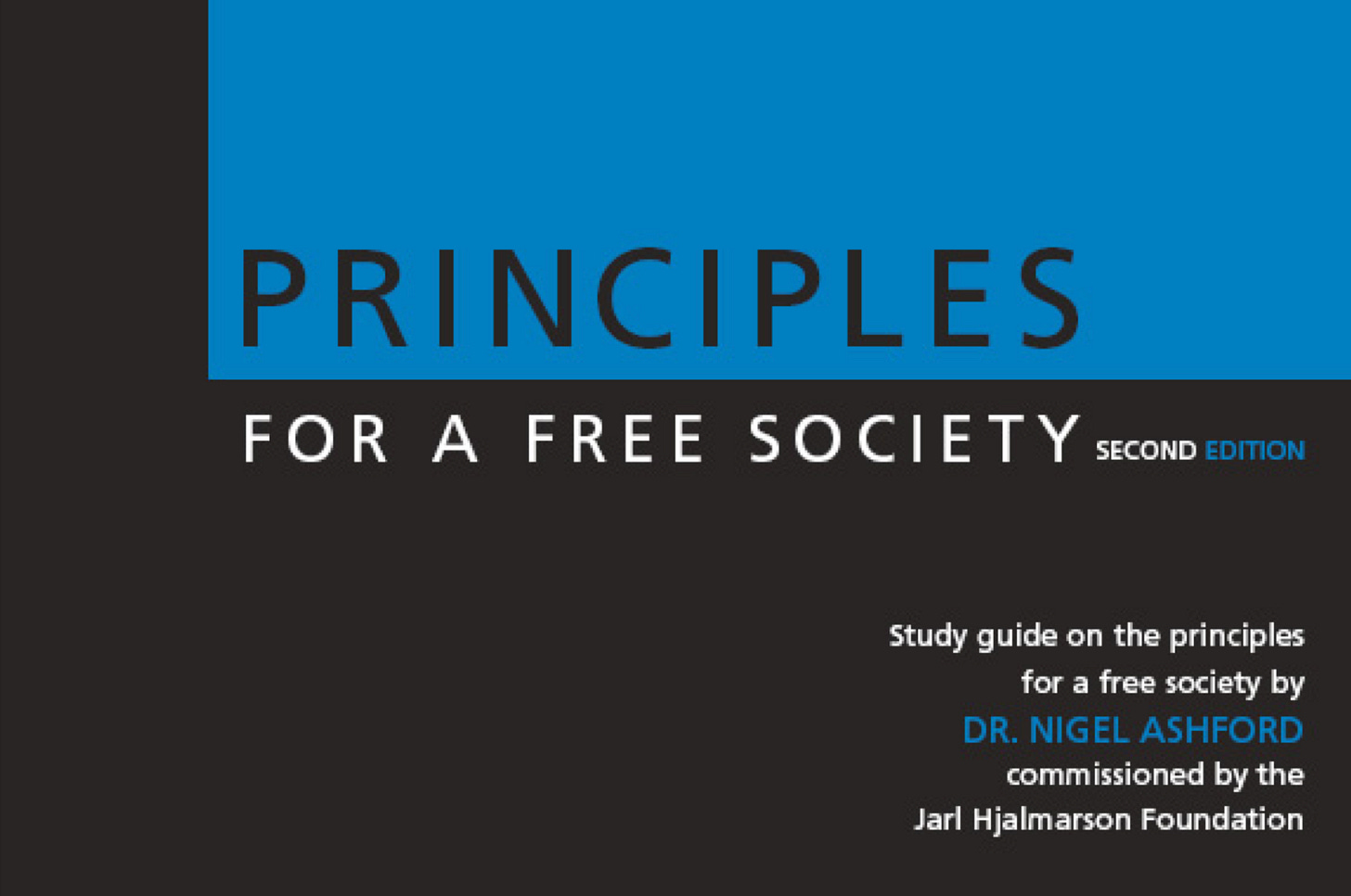The Principles for a Free Society
We are fighting for a free future - but what does that mean? Twelve principles every citizen could reasonably demand from politicians, journalists and public figures.
“Among the laws that rule human societies there is one which seems to be more precise and clear than all others. If men are to remain civilised or to become so, the art of associating together must grow and improve in the same ratio in which the equality of conditions is increased.” – Alexis de Tocqueville

A concerned citizen might reasonably ask today why the world is not working as well as we would wish. It was a question I began seriously asking in about 2006.
I started reading elsewhere, but if I had known about Principles for a Free Society by Dr Nigel Ashford for the Jarl Hjalmarson Foundation, I would have started here. In just 92 pages, the book presents 12 principles with unrivalled clarity and brevity. The book was the foundation of the book club I ran in Parliament.
The principles are:
Civil society
Democracy
Equality
Free enterprise
Freedom
Human rights
Justice
Peace
Private property
The rule of law
Spontaneous order
Toleration
I strongly recommend the book but I will highlight the two principles about which I believe we have the most trouble today.
Equality
Misconceptions about equality are at the heart of many of our difficulties. The pursuit of a kind of cosmic justice which accounts for past wrongs and yet provides equal outcomes today is at the heart of much muddled, damaging and dangerous political thought and social policy.
Ashford explains:
Equality is the principle that people should be treated the same or equally. Yet people are obviously not the same or ‘equal’ in most of their characteristics, in talents, abilities, looks or preferences. No one believes that every human being is the same, so in what sense are people equal? The debate about equality is about when it is, and is not, right to treat people the same. At least five different types of equality can be identified: moral (or formal) equality, equality before the law, political equality, equality of opportunity, and equality of outcome. The first three types are desirable; the last is highly undesirable; and the value of equal opportunity depends upon how it is interpreted.
It is an unfortunate and regrettable historic fact that treating people equally was ignored as a moral principle or thought incompatible with the real world. Thankfully we have moved forward in ways that benefit all but predators who would force their will on the rest of us.
First, every person is formally equal from a moral point of view: equally entitled to make choices about their lives. From that follows a requirement that everyone is equal before the law, treated impartially regardless of identity. It is a lesson we must relearn.
Political equality also follows, insisting on votes for all except where there is a valid and legitimate reason to deny it, such as imprisonment or being a child. Just as each of us is equally entitled to make choices in our life, each of us is equally entitled to elect politicians. Equal constituency sizes in the UK was one corollary and yet look how long that took: 14 years, thanks to practical political problems.
Equal opportunity means people should have the chance to succeed in life as they interpret success. No one should be restrained from taking opportunities: they should be open irrespective of identity. It means a meritocracy: ability plus effort enabling people to flourish without unfair obstacles.
Alas that positive discrimination - despite its often noble intent - raises obstacles to those thought undeserving. I find it increasingly raises hackles when people who have not lived privileged lives in the UK feel, and can demonstrate, they have been disadvantaged through no fault of their own. Positive discrimination denies the moral, legal and political equality and equality of opportunity: it is wrong.
The most frequently used sense of equality - the one which consumes the political Left - is equality of outcome: egalitarianism. In that sense, equality pursues results and rewards, not the conditions in which people participate in society, this rich dynamic tapestry of relations between us all. It too denies the other, fundamental kinds of equality, leads to injustice and undermines the rule of law.
Consider this: is justice in the process of living - “getting your just deserts,” for good or ill - or is it in equal outcomes whatever people do? Civilisation may turn, and has turned, on the answer.
Toleration
To tolerate something is to dislike it intensely but put up with it, one way or another.
Agreement and toleration are different things. That is, toleration is not the enforcement of a single progressive consensus, outside which people are cancelled.
Toleration is to agree to disagree and go your way in peace. To live and let live.
It is one of the most forgotten principles for a free society and one which needs rediscovering urgently and robustly.
Conclusion
The dominant centre left ideology of past decades has undermined the principles of a free society with inevitable, damaging consequences. It is not because people are treated equally that they complain today of “two-tier policing”: it is because they are absolutely convinced people are being policed differently based on their identity.
If that is true, and it seems to be, then it should be called out as a repudiation of the ideas on which our country and western civilisation are built.
Ashford’s book is a great place to start. Get and share the PDF: https://bit.ly/PrinciplesFS-PDF
Further Reading
Some of these, and much more, will be available free online, particularly in the Online Library of Liberty.
Foundations of a Free Society, Butler (A great alternative to Ashford’s book)
Liberalism: The Classical Tradition, Mises (Liberty Fund Library of the Works of Ludwig Von Mises)
Anarchy State and Utopia, Nozick (Part 2 is an exploration of the two ideas of justice related to traditional equality vs egalitarianism)
The Open Society and Its Enemies: Volume 1: The Spell of Plato (A classic on the origins of tyranny)
Theory and History: An Interpretation of Social and Economic Evolution, Mises (A deep exploration of the intellectual trends which have led to the negation of the principles of a free society today)



Toleration is a significant issue. It appears today that if you don't agree with someone's views, you are "wrong"! In some circumstances you don't get the chance to put your views across, as you are shutdown before you get that far.
Unfortunately we currently live in an angry/frustrated society..which doesn't align well with rational thinking
I appreciate your analysis lots to think about, however, I think the conclusion about equality of opportunity and positive discrimination needs more nuance. While a meritocracy based on ability and effort is ideal, it's important to recognise that not everyone starts from the same point.
True equality of opportunity sometimes requires positive actions to level the playing field. This isn't about denying merit, but rather ensuring that everyone has a fair chance to develop and demonstrate their abilities. For instance, why should someone be disadvantaged simply because their parents faced hardships?
Positive discrimination, when applied thoughtfully, can actually enhance equality of opportunity by removing unfair obstacles that some groups face: working classes, second generation immigrants, person with disabilities. It's not about guaranteeing outcomes, but about creating a more equitable starting point for all.
In essence, I believe that a well-implemented system of positive action can support, rather than contradict, the principles of meritocracy and equality of opportunity. It's about creating a society where everyone has a genuine chance to succeed (and contribute) based on their merits, regardless of their background. I would like to suggest that some of the ills we see today, might be decreased if everyone truly was given a fair start. (note I write decreased not eliminated)